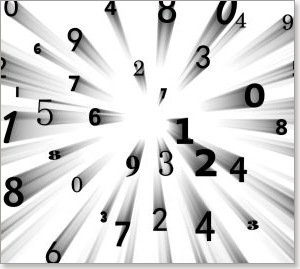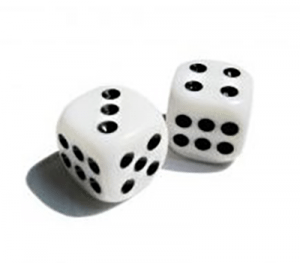Gambling is often a game of luck. In this article we talk about lucky numbers, and why often people will play these same numbers, spin, after spin, after spin. These numbers can stem from personal beliefs, events, or even cultural values. It’s no different with roulette players, with most having a few lucky numbers up their sleeve.
Why do people have lucky numbers?

Since there is no scientific evidence behind lucky numbers helping the number of times a player may win, many wonder why gamers are attached to certain numbers – because if certain numbers were lucky wouldn’t everyone pick them?
It’s been proven that the subconscious doesn’t agree with randomness, and it actually always wants to have a sense of control, even when realistically, you don’t. For example, some craps players don’t use as much force when throwing dice if they are after low numbers, believing a gentle throw will result in a lower number. In reality, this action has absolutely no influence on the outcome of a dice throw, but some people will believe anything in the hopes of feeling in control.
So essentially people have lucky numbers because it gives them a sense of control, whether they know that or not.
Where do gamers find their lucky numbers?
Lucky numbers can be attributed to personal event or a completely random system.
Many cultures have their own beliefs surrounding certain numbers and use this when playing roulette. Western and Japanese culture looking towards the power of the number seven to bring good luck, while believing the number 13 brings bad fortune. Chinese culture looks to six, eight and nine as lucky numbers due to the similarity to other positive Chinese words.
Depending on your cultural values, you may be more inclined to pick a certain number. Some people even combine these cultural beliefs without realising, as seven and eight are extremely popular despite both being deemed bad luck in the some cultures. Some players even attest lucky numbers to certain religious beliefs.
Other people may prefer a more personal approach in finding their lucky numbers. Many use personal dates such as birthdays, anniversaries or other number-based events, since these dates were lucky to them in a personal sense, they generally seem to view them as positive numbers. Some may consider the number of their house or their age lucky – this not only personalises the game but certainly helps when trying to decide what number to bet on.
Although it may appear lucky numbers don’t improve strategy, it certainly doesn’t hinder results in a game of pure luck. Even casinos are superstitious, with some land based venues avoiding tables with the number four (including 14, 24, 34, and 40 to 49) because it is considered unlucky in Chinese culture.
Lucky numbers in roulette
Roulette is a game of pure luck and there really isn’t a way to formulate a mathematical strategy, so perhaps if you want to play lucky numbers roulette is the best game to try your hand.
For European Roulette, you have 36 numbers to choose from although logic and reason tells us all numbers are equal, those who have won with their lucky numbers prove it is worth a try. American Roulette also has the option to bet on red or black, even or odds, columns and rows but has zero and double zero, with 1:37 odds.
Although there isn’t a strategy for beating roulette, players can employ a set betting pattern with their lucky numbers when they play roulette. Instead of putting chips all over the layout, make bets which cover multiple numbers on a street and also a straight bet on a single number. This may grind you out small wins and even let you stay in the game for longer. For example you can make multiple bets on the same spin of the roulette wheel. If your lucky number is 23, you might bet $1 on the 23, $5 on the 22-23-24 street and $20 on the high numbers of 19-36. Not only does this strategy allow for low risk with some benefit of high return, but it also allows you to win on your lucky numbers which is more satisfying in the roulette world.
Why is seven such a common number in roulette?

Even Abe Simpson picked seven when he was rolling the dice on an episode of the Simpsons, saying “Come on, lucky seven! Poppa needs a new pair of spats. I want some of that sweet, sweet Do Re Mi. Fat city, here I come!”
Seven doesn’t necessarily win more than any other number, rather it stems from multiple influences including popular culture as Abe Simpson has shown us.
Seven is associated with religion and spirituality with Christianity, among other beliefs having the number 7 as an important number in one way or another. These small beliefs put in peoples heads may have them more inclined to choose this number due to instinct and the way they were brought up.
In terms of gaming, it is the total of all opposite sides of a single die and it is also the most common double dice roll, proven by statistics since it is right in the middle, with combinations of 6+1, 5+2 and 4+3.
Even a Roulette wheel in Vegas happened to hit the same number seven times in a row. So even if seven has the same potential as all the other numbers do on the roulette wheel, you would be be forgiven for choosing it.
To be or not to be superstitious
Surprisingly, choosing to believe in fate can be extremely beneficial as winning with your lucky numbers can be more fun in the end. Assuming you have a lucky number or numbers, there is certainly nothing wrong with sticking to them in roulette and believing they will bring you good luck.
The only problem with being superstitious is believing your numbers are a winning combination and have better odds, because you could get carried away with large bets and lose a lot. Your best bet is to try your lucky numbers with small bets and you’ll be feeling like a leprechaun with a pot of gold before no time. Most importantly, never forget the golden rule of roulette, which is to remember that this is a game of chance with absolutely nothing you can do to influence the outcome of the spin, superstitious or not.
While this author is not a big believer, on a personal level, of lucky numbers or the superstitions around them, many people do, including those who run online casinos. This is blatantly obvious when you look at a casinos targeting China, with many having a six or an eight in their marketing or name.
